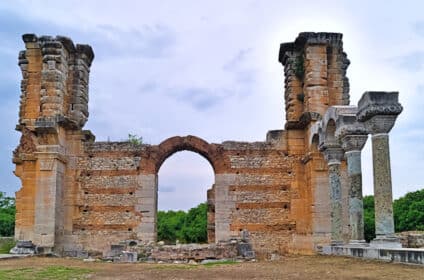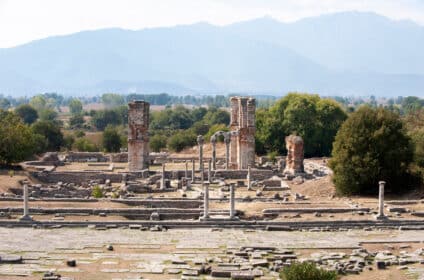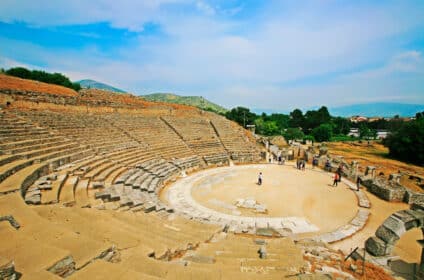- Viewed - 511
Description
The ancient city of Philippi, now the most important archaeological site in Eastern Macedonia, lies at the boundary of the marshes that cover the southeast part of the plain of Drama. The site was originally colonized by the people of Thasos, who, aware of the area’s plentiful supplies of precious metals, timber, and agricultural products, established the city of Krinides in 360 BC. Soon after its establishment, however, Krinides was threatened by the Thracians (365 BC) and turned to King Philip II of Macedon for help. Realizing its economic and strategic potential, Philip conquered, fortified, and renamed the city after himself.
Hellenistic Philippi had a fortification wall, a theatre, several public buildings, and private houses. The construction of the Via Egnatia through the city in the second century BC made Philippi an important regional centre. The dramatic battle of Philippi, which took place outside the west city walls in 42 BC, was a turning point in the city’s history. The city was conquered by Octavian and renamed Colonia Augusta Julia Philippensis. The new Roman colony developed into a financial, administrative, and artistic centre.
Another important event marked the city’s history a century later. Saint Paul founded the first Christian Church on European soil at Philippi in 49/50 AD. The establishment of the new religion and the city’s proximity to Constantinople, the Roman Empire’s new capital, brought new splendour. Three magnificent basilicas and the Octagon complex, the cathedral dedicated to Saint Paul, were erected in the city centre in the fourth-sixth centuries AD. After a series of earthquakes and Slavic raids, the lower city was gradually abandoned early in the seventh century. Philippi survived into the Byzantine period as a fortress, until its final demise in the late fourteenth century, after the Turkish conquest.
Excavations at Philippi began in 1914 under the French School at Athens and were resumed by the Greek Archaeological Service and the Archaeological Society at Athens after the Second World. The site is currently excavated by the Greek Archaeological Service, the Aristoteleian University of Thessaloniki, and the French School at Athens. The finds are stored at the Philippi Archaeological Museum. Every summer (May-September) the site is cleared of undergrowth.
Administrative Information:
Ephorate of Antiquities of the Prefecture of Kavala
Filippoi (Prefecture of Kavala)
Telephone: +30 2510 516251
Fax: 2510622810
Email: efakav@culture.gr
Tickets:
Full: €6, Reduced: €3
Access:
It lies next to the Municipal Department of Krinides, 15 km from Kavala and 21 km from Drama. The visitors can reach the site by bus (KTEL) or car. 31 km east of Kavala lies the airport.
Shop:
The Museum Shop of the Archaeological Resources Fund Receipts is near the parking and the cafeteria of the archaeological site.
In addition, there are cards, slides, and some publications of the Archaeological Resources Fund Receipts in the ticket stands of the two entrances of the archaeological site.
Source: www.odysseus.culture.gr
Ephorate of Antiquities of the Prefecture of Kavala
Gallery / Photos
Location / Contacts
- Address : Filippoi, Kavala
- Phone : +302510516251
- Mail : efakav@culture.gr
- Website : http://odysseus.culture.gr





